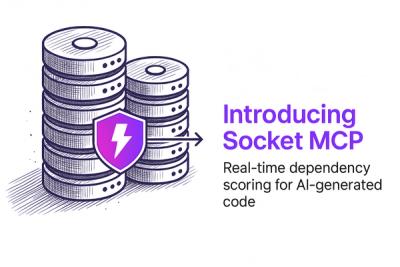
Product
Secure Your AI-Generated Code with Socket MCP
Socket MCP brings real-time security checks to AI-generated code, helping developers catch risky dependencies before they enter the codebase.
Some tools for debugging and profiling Ruby on Rails projects. Included:
User is responsible for requiring gems necessary for rendering output.
For example, when :yaml option is used with WTF?, we expect that YAML is already loaded.
Library requirements for specific options are documented below.
WTF? my_var # basic
WTF? my_var, other_var, { some: data }, :pp # more data, option: pretty-print
WTF? :label, records, :bare, :time # multiple options given
data.wtf(:time).some_method # inline call
Supported options
Prefix
(default) WTF (my_file_name/method_name:227):
:np no default prefix
:nl new line before the record
:time with timestamp: [2014-10-28 12:33:11 +0200]
Formatting
(default) simple Ruby inspect
:pp pretty-print, require 'pp'
:yaml YAML format, require 'yaml'
:json JSON format, require 'json'
:csv CSV format, require 'csv'
:text simple Ruby to_s
:line modifier, each object in separate line
:bare modifier, ActiveRecord with just id attributes: #<MyClass id: 1234>
:name like :line, but with names taken from source file
Output control
:puts to STDOUT (default)
:file to a separate file in configured location
:error raise the string containing data as exception
class MyClass
def run_something
WTF.time {
# your code
}
end
end
Output:
WTF (my_class/run_something:3): 0.001
class MyClass
def run_something
WTF.track(self)
# lots of code
WTF.track_finish
end
end
Additionally, extra classes/modules can be given:
WTF.track(self, OtherClass, Helpers)
This will create a CSV file in configured location, containing profiling info. Profiling happens only in the methods of the calling class, and any other given class.
How it works: every method in MyClass and OtherClass is overridden, adding resource measuring code.
All calls to those methods from the code between track and track_finish are measured (time and memory).
Sum amounts are written as CSV file, sorted by total time used.
Example output:
class,method,count,time,heap_mb
,top,0,0.948,0.0
Overview,some_helper,16408,0.351,0.0
Overview,my_records,28,0.172,0.0
Overview,load_data,1,0.166,0.0
...
Warning: tracking method calls adds time overhead (somewhere from 10% to 3x, depending on number of times the methods were called).
class MyClass
def run_something
WTF.sql %q{SELECT * FROM `my_records` WHERE `attribute`='value' AND `etc`}
WTF.sql /^UPDATE `my_records` SET .*?`some_values`=/, size: 10
# lots of code
end
end
This will add a WTF?-style dump in the default location, containing stacktrace where given SQL statement was generated. SQL must match exactly as strings.
Configure WTF before using the above-mentioned facilities.
Rails initializers directory is a good place to put it.
Subkeys of output must be lambdas taking one string argument. They are merged into default output options.
WTF.options = {
files: "#{Rails.root}/log/wtf",
output: {
default: ->(data) { Rails.logger.info(data) },
redis: ->(data) { Redis.new.rpush(:wtf, data) },
}
}
require 'yaml' # to use :yaml option, etc
Requirement: Ruby 2.0, because the technique used involves module prepend-ing, which is not available in Ruby 1.9.
This is released under the MIT License.
This gem is sponsored and used by SameSystem

FAQs
Unknown package
We found that wtf-tools demonstrated a not healthy version release cadence and project activity because the last version was released a year ago. It has 1 open source maintainer collaborating on the project.
Did you know?

Socket for GitHub automatically highlights issues in each pull request and monitors the health of all your open source dependencies. Discover the contents of your packages and block harmful activity before you install or update your dependencies.

Product
Socket MCP brings real-time security checks to AI-generated code, helping developers catch risky dependencies before they enter the codebase.

Security News
As vulnerability data bottlenecks grow, the federal government is formally investigating NIST’s handling of the National Vulnerability Database.

Research
Security News
Socket’s Threat Research Team has uncovered 60 npm packages using post-install scripts to silently exfiltrate hostnames, IP addresses, DNS servers, and user directories to a Discord-controlled endpoint.